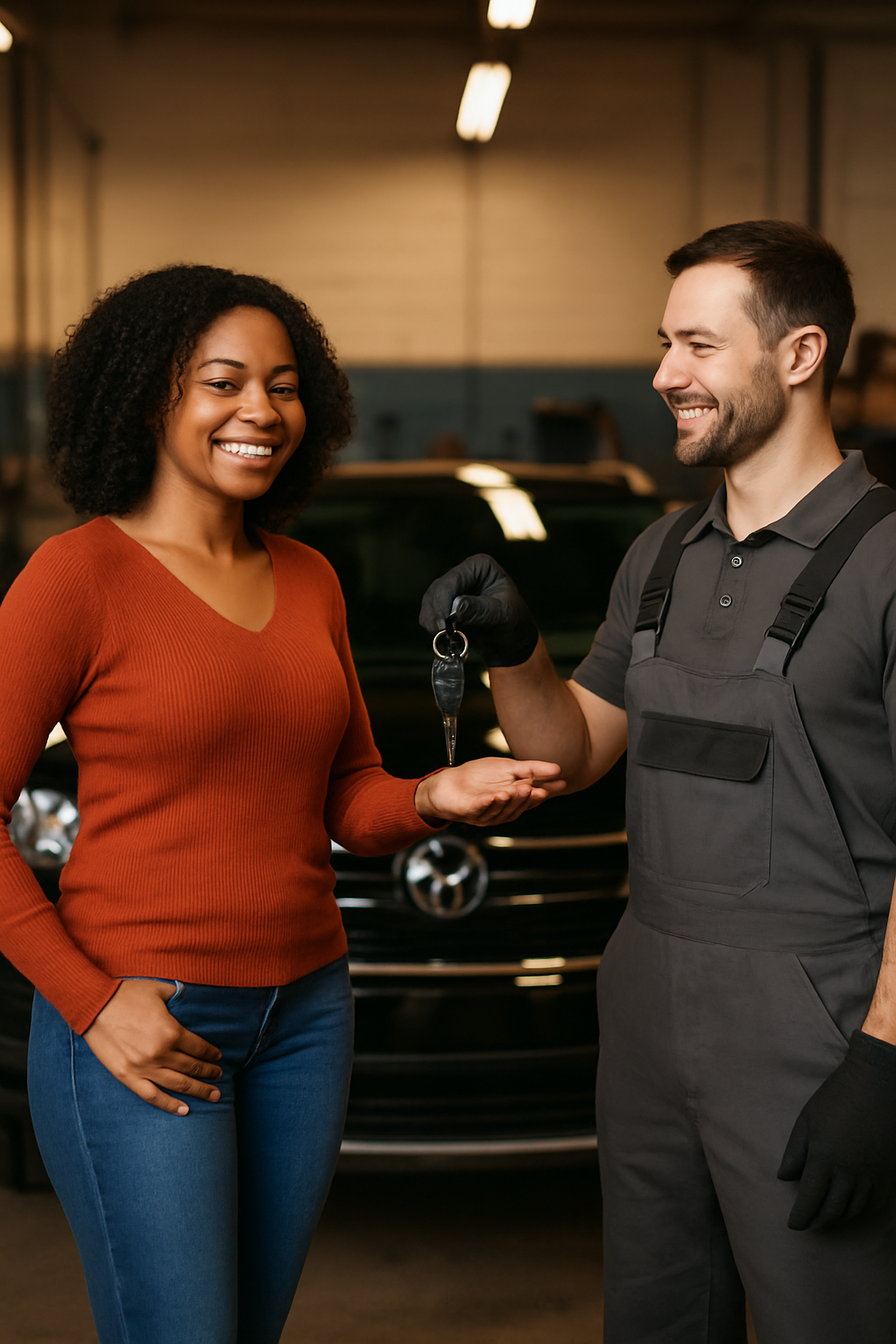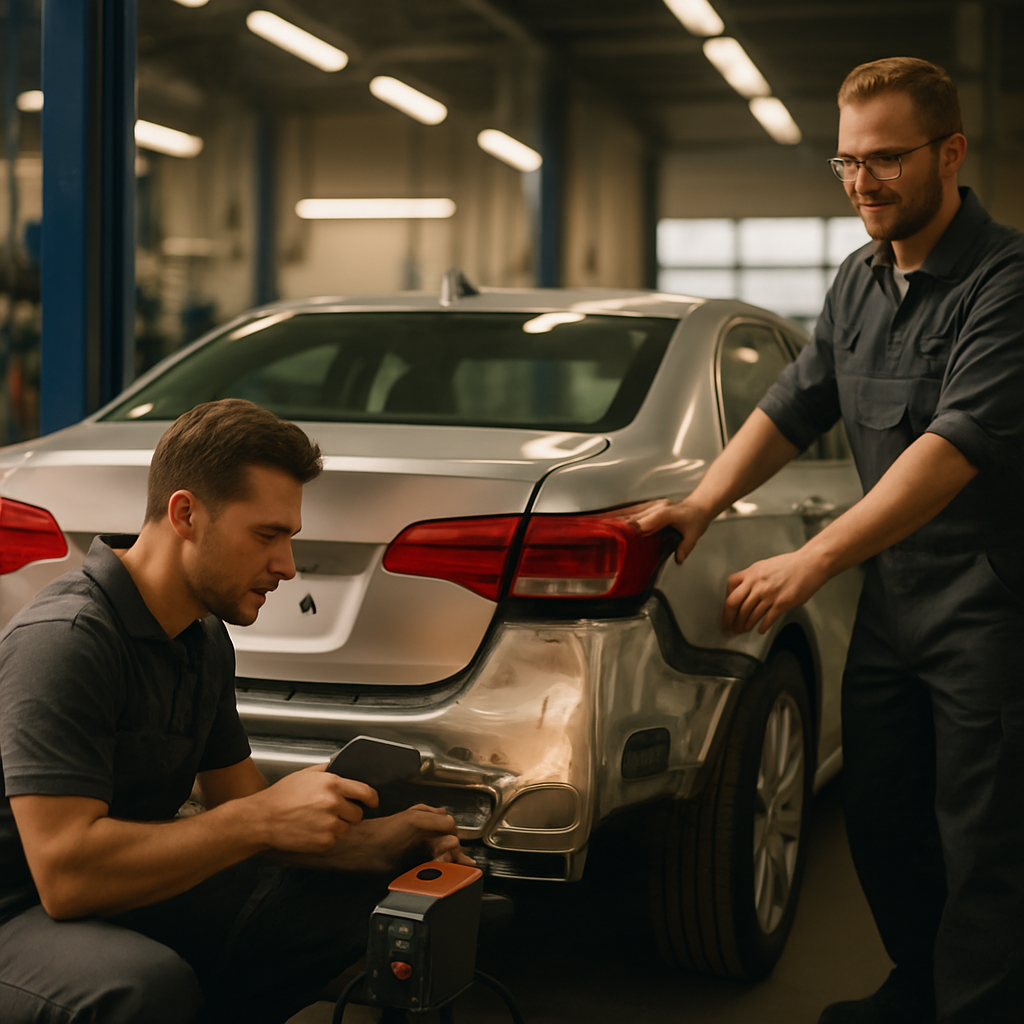Collision Coverage: Pays to Repair or Replace Your Car After an Accident—Even If You’re at Fault
Vehicle repairs can be costly after a crash, even for careful drivers. Collision Coverage steps in to pay for damage to your car if you hit another vehicle or object, helping bridge the financial gap between an accident and getting back on the road.

When Collision Coverage Makes the Difference
Real scenarios that show exactly when and how collision coverage protects you.

Backing Into a Light Pole
Samantha was leaving work when she accidentally backed into a parking lot light pole, denting her rear bumper. Her collision coverage handled the $1,900 repair bill. Instead of paying the full amount out of pocket, Samantha only paid her $500 deductible and was driving her car again in days.

Rear-Ended at a Stoplight
Mike was stopped at a red light when another driver braked too late and hit his car. Even though the other driver’s insurance was slow to respond, Mike’s collision coverage paid the $4,200 repair cost upfront. Instead of weeks of waiting, Mike’s repairs started immediately thanks to the coverage on his policy.

Totaled Vehicle After a Storm
Erin’s car spun out and hit a guardrail during a sudden downpour, resulting in a total loss. Collision coverage paid out $16,500 for the car’s value minus her deductible. Instead of facing a major financial setback, Erin was able to replace her car and get back on the road safely.
Everything You Need to Know About Collision Coverage
The complete picture: what's covered, what's not, and how to decide if you need it.
Collision Coverage (Plain English)
Collision coverage is protection for your car when it’s damaged in an accident with another vehicle or object. When you’re at fault, this coverage pays for repairs or helps replace your car up to its value after you pay a deductible. The key thing to understand is that it protects your own vehicle, not someone else’s.
The Fine Print
Deductible: You pick an amount (usually $500–$1,500) you'll pay out of pocket before your coverage pays the rest. Limits: Payouts typically max at your car’s actual cash value at the time of the accident, not its original or purchase price. Payment Method: Insurers often pay the shop directly or pay you if the vehicle is totaled. Coverage applies only to listed vehicles during the policy period and only for covered types of loss—so always double-check what’s included.
Collision Coverage vs. Other Coverages
Collision coverage is NOT the same as comprehensive coverage. Collision pays for your car’s damage from crashes or hitting objects, while comprehensive covers things like theft, vandalism, fire, or hail. You typically need both for full protection.
Who Needs Collision Coverage?
You typically need this coverage if:
- You are financing or leasing your vehicle (your lender usually requires it)
- Your car is newer or valuable and you can’t afford to replace it
You might skip this coverage if:
- Your car is older and not worth much (cost may outweigh benefit)
Coverage Limits and Options
Limits are set at your car’s actual cash value (ACV) at the time of the accident. You can choose your deductible amount—lower deductibles mean higher premiums but less out-of-pocket cost in a claim. Some policies offer rental car reimbursement if your car is in the shop after a covered loss. Review available options to tailor your protection.
What's NOT Covered by Collision Coverage
This coverage does NOT cover:
- Damage from things other than a crash: For theft, vandalism, fire, or hail, you need comprehensive coverage
- Bodily injury or damage to others: Those require liability coverage
For these situations, you'd need comprehensive and liability coverages.
See Your Price with Collision Coverage Included
Now that you understand collision coverage, see how affordable protection can be with personalized quotes from 26+ carriers.

Trusted Coverage Guidance Since 1992
1,430+ customers trust our expertise to explain coverage clearly and find the right protection for their specific needs.
4.9/5 Stars
Google Reviews from real customers, just like you
97% Retention
Customers stay with us year over year over year
Independent
We work for you, not insurance companies
Local
Fort Collins owned & operated since 1992
How Collision Coverage Actually Works
Understanding exactly what happens when you file a collision coverage claim—from start to finish.
The Claims Process
- Report the Incident: Contact your insurance company as soon as possible. They’ll gather information and assign your claim a reference number.
- Damage Assessment: An adjuster will inspect your car (in-person or via photo) to confirm coverage and estimate repair costs.
- Repair Authorization or Total Loss: If repairable, take your car to a trusted shop; if totaled, the insurer calculates your car’s value for settlement.
- Resolution: Pay your deductible directly to the shop, and your insurer pays the remainder (or you receive payment for a total loss). You’re back on the road—protected and supported.
What You Pay
Your deductible—typically $500–$1,500—is the amount you pay first on a covered claim. Your premium covers the ongoing protection the policy provides. The deductible you choose directly impacts your premium: higher deductibles mean lower monthly costs, but remember to pick a deductible you can afford to pay in an emergency.
Timeline
Simple claims often resolve in one to two weeks, while complex situations involving major damages or disputes may take several weeks. Most customers find the process straightforward, especially with timely reporting and documentation. The key is prompt reporting—the sooner you file, the faster things get resolved.
What Collision Coverage Actually Costs vs. What You Risk
Understanding the real financial impact: what you pay for coverage vs. what you risk without it.
Fender Bender
Annual Coverage Cost: $290
Scenario: You accidentally bump another car in a crowded parking lot, causing $2,000 in damage to your vehicle.
Without Coverage: $2,000
With Coverage: $500 deductible (plus your annual premium)
Protection Value: $1,500 saved in this scenario alone
Multi-Car Accident
Annual Coverage Cost: $290
Scenario: Sliding on icy roads, you hit another car and a guardrail. Repairs cost $4,800.
Without Coverage: $4,800
With Coverage: $1,000 deductible (plus your annual premium)
Protection Value: $3,800 saved in this scenario alone
Total Loss
Annual Coverage Cost: $290
Scenario: Your car is totaled after skidding off the road—value at accident time: $15,500.
Without Coverage: $15,500
With Coverage: $1,500 deductible (plus your annual premium)
Protection Value: $14,000 saved in this scenario alone
The Economic Reality
For most people, collision coverage costs about $24 per month—less than dinner out. One incident without coverage could cost $2,000–$20,000, which might take years to recover from financially. The math is simple: collision coverage pays for itself the first time you need it, and can help protect your financial stability after just one major incident.
4 Costly Collision Coverage Mistakes to Avoid
Learn from others' mistakes - avoid these common errors that can leave you unprotected when you need coverage most.
Choosing Deductibles You Can't Actually Afford
It’s tempting to pick a high deductible to lower your premium, but if you don’t have enough saved to cover it, your repairs may be delayed or unaffordable. You could be stuck without a car when you need it most. Instead, choose a deductible you know you can pay quickly—even in an emergency.
Letting Coverage Lapse on a Financed or Leased Car
Dropping collision coverage to save money while you still owe money on your vehicle is a risky move—lenders usually require it, and dropping it puts you at risk for financial hardship. You could owe more than your car is worth after an accident. Always verify lender requirements before removing this coverage.
Assuming Liability or Comprehensive Coverage Protects Your Own Vehicle
Many people confuse coverages—liability covers damage to others, comprehensive covers non-collision losses. Neither pays for your own collision repairs. Make sure you have collision coverage if you want your own car repairs covered after a crash.
Not Updating Coverage as Your Car Ages
If your car loses significant value, collision coverage may no longer be cost-effective. Paying too much for coverage you don’t need drains your finances. Review your policy yearly and adjust coverage as your car’s value changes.
Find answers to your most pressing insurance questions right here.
Explore Your Coverage Options
Discover the best insurance coverage tailored to your individual needs and protect what matters most.

